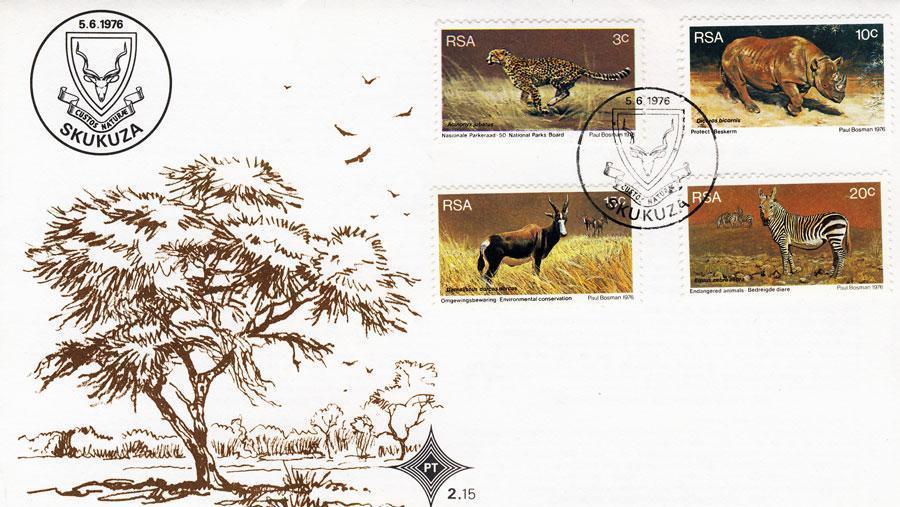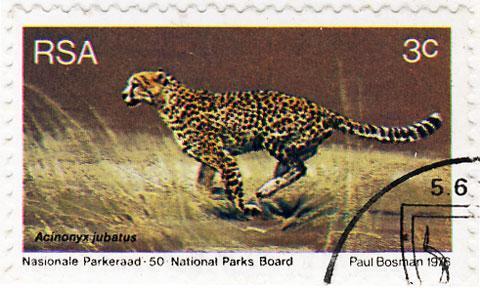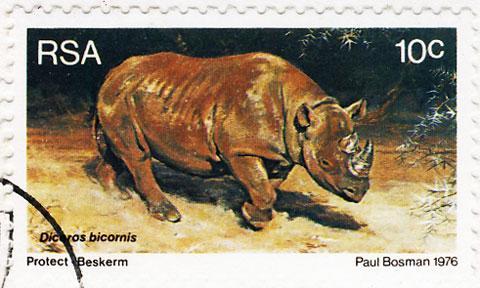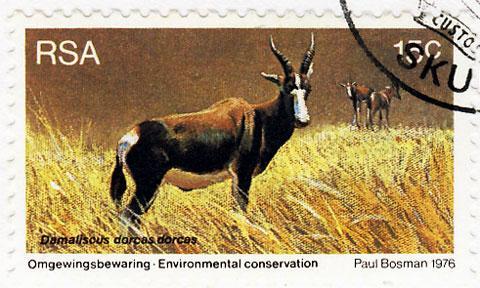Endangered animals of South Africa
Endangered species in South Africa, discover the endangered and protected species in South Africa. See images and photos.

 THE CHEETAH (ACINONYX JUBATUS)
THE CHEETAH (ACINONYX JUBATUS)
In the South African national parks, the cheetah is still found in the Kruger and the Kalahari Gemsbok National Parks. A cheetah is often mistaken for a leopard. However the leopard is shorter and has a sturdier and heavier build than the cheetah which is more slender and has a small head with a distinct black stripe extending from each eye to the corners of the mouth.The cheetah also differs from the leopard in that the spots on its body are oval and round and change to alternate black and white rings towards the tip of its tail. The animal’s mass is approximately 50 kg and it stands about 100 cm high at the shoulder. The fastest speed achieved by a charging cheetah is about 100 km/h.
DIE JAGLUIPERD (ACINONYX JUBATUS)
In Suid-Afrika se nasionale parke kom die jagluiperd nog voor in die Nasionale Krugerwildtuin en in die Nasionale Kalaharigemsbokpark. Die jagluiperd word dikwels met die luiperd verwar. Die luiperd is egter korter, stewiger en swaarder gebou in vergelyking met die jagluiperd wat slank gebou is en ‘n klein kop het met ‘n duidelike swart streep wat van elke oog tot in die mondhoeke strek.Verder verskil die jagluiperd van die luiperd in dié opsig dat die kolle op sy lyf oval en rond is en oorgaan in afwisselende swart en wit ringe na die punt van die stert. Die massa van die jagluiperd is sowat 50 kg en die skouerhoogte sowat 100 cm. Die vinnigste spoed wat ‘n jagluiperd in ‘n stormloop behaal het, is sowat 100 km/h.
 THE BLACK RHINOCEROS (DICEROS BICORMIS)
THE BLACK RHINOCEROS (DICEROS BICORMIS)
Black rhinoceroses are found in two of the ten South African national parks. In the Addo Elephant National Park there are 11 black rhinoceroses at present and the Kruger National Park has an estimated 30 to 40. When fully grown, these huge animals often reach a mass of between 1000 and 2 000 kg and stand 160 cm high at the shoulder. A rhinoceros charges at about 45 km/h. A record length of 135 cm has been recorded for the front horn. The black rhinoceros has a pointed upper lip extending over the lower lip whereas the white rhinoceros has a broad upper lip. The black rhinoceros is a dark grey colour.
DIE SWARTRENOSTER (DICEROS BICOMIS)
Swartrenosters kom in twee van Suid-Afrika se tien nasionale parke voor. In die Nasionale Addo-olifantpark is daar tans 11 swartrenosters en in die Nasionale Krugerwildtuin is daar na skatting tussen 30 en 40. Hierdie kolosse kan, wanneer hulle volgroei is, ‘n massa van tussen 1000 en 2 000 kg en ‘n skouerhoogte van sowat 160cm bereik. Die dier storm teen sowat 45 km/h. ‘n Rekordlengte van 135 cm vir die voorste horing is aangeteken. Die swartrenoster het ‘n gepunte bolip wat oor die onderlip strek. Die witrenoster daarenteen het ‘n breë bolip. Die swartrenoster is donkergys vankleur.
 THE BONTEBOK (damaliscus pygargus)
THE BONTEBOK (damaliscus pygargus)
The bontebok (damaliscus pygargus)Half a century ago the bontebok was considered to be the rarest species of buck in the world in 1931, the National Parks Board established the Bontebok National Park at Bredasdorp with a nucleus herd of 17 animals. In 1960, the park was moved to Swellendam where more spacious ground was available. Many buck have already been donated to other bodies for breeding purposes and at present there are about 240 in the park. The bontebok, which was threatened with extinction, has thus been preserved for posterity.
DIE BONTEBOK (DAMALISCUS PYGAGUS)
‘n Halfeeu gelede is die bontebok beskou as die skaarsste boksport ter wêreld. In 1931 het die Nasionale Parkeraad met ‘n kernkudde van 17 bontebokke die Nasional Bontebokpark by Bredasdorp gestig. Die park is in 1960 na Swellendam verskuif waar groter grond beskikbaar was. Tans nadat daar reeds baie bontebokke vir teeldoeleindes aan ander instansies beskikbaar gestel is, is daar sowat 240 bontebokke in die park. Die bontebok, wat met uitsterwing bedreig is, is dus vir die nageslag bewaar.
 THE MOUNTAIN ZEBRA (EQUUS ZEBRA)
THE MOUNTAIN ZEBRA (EQUUS ZEBRA)
The mountain zebra can surely be regarded as one of the rarest mammals in the world. Since 1937, when the National Parks Board bought the farm Babylons Toren near Cradock, it has done everything in its power to save this rare species from total extinction. Unlike Burchell’s zebra, the mountain zebra has a distinct dewlap. It has no shadow stripes and the stripes do not extend round the belly. Those around the legs are distinct down to the hooves and they extend right round the legs. In the Mountain Zebra National Park there are at present 160 of these precious, rare animals out of a total of some 200 still found in the world.
DIE BERGKWAGGA (EQUUS ZEBRA)
Die bergkwagga kan sekerlik as een van die skaarsste soogdiere ter wêreld beskou word. Sedert 1937 het die Nasionale Parkeraad met die aankoop van die plaas Babylons Toren naby Cradock alles in die stryd gewerp om hierdie skaars diersoort van algehele uitsterwing te red. Anders as by die bontkwagga is daar by die bergkwagga ‘n duidelike keelvel aanwesig. Daar is by die bergkwagga ook geen skadustrepe nie en die strepe reik ook nie om die pens nie. Die strepe aan die bene is duidelik tot op die hoewe en hulle strek rondom die bene. In die Nasionale Bergwaggapark is daar tans 160 van hierdie kosbare, skaars diere uit ‘n total van sowat 200 wat nog in die wêreld aangetref word.
Call us and schedule your listing today! Contact Us
Copyright © 2025 Hermanus Online Magazine. Web Development by Jaydee media.
